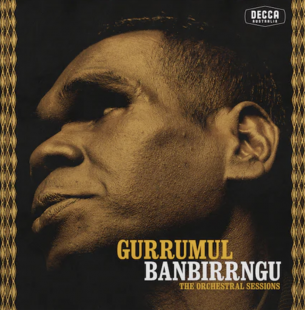Graham Reid | | 2 min read
Wiyathul

When the late Aboriginal artist Gurrumul (now referred to as Dr G Yunupingu) from the small and remote Elcho -- an island off the north coast of Australia near Darwin (population 2300 at the time) – emerged as a solo artist in the 2000s he was a great story, in part because he was blind and rarely spoke to the media.
He was shy as many Aboriginal people are, and even though writing for the biggest newspaper in New Zealand I could only speak to his friend/mentor/producer and bass player Michael Hohnen of Skinnyfish Music in Darwin.
Gurrumul may have come from a tiny settlement but by the time he was releasing solo albums he had been a member of the acclaimed Yothu Yindi and the Saltwater Band. He was a self-taught musician and not unaware of Western music: he liked Dire Straits.
But the mystique around him was enhanced by the purity of his voice, a kind of holy resonance which seemed to convey a spirituality in his native Yolngu language, impenetrable to outsiders.
So his appeal was a voice that could transport listeners to a place beyond words and language.
He released a series of award-winning studio albums and two live albums, one with the Sydney Symphony Orchestra recorded in the Opera House.
He died at age 46 in 2017 and tributes came from across the political and music spectrum, hailing a man who had done so much for his people and bridging cultural divides.
Music has the power to do that.
There have been posthumous Gurrumul albums before and now comes the 10-song Banbirrngu – The Orchestral Sessions with new arrangements of some of his most emotionally moving songs rearranged by Finnish-Australian musician Erkki Veltheim and played by the Prague Metropolitan Orchestra.
Most of the new arrangements – as with those on the posthumous Djarimirri (Child of the Rainbow) of 2020, also arranged by Veltheim – err towards the subtle and understated, deliberately stepping out of the way to allow Gurrumul's extraordinary voice takes centrestage.
Again he transports us from beyond this life in songs which are deliberately undramatic and stop just the right distance from sentimentality.
Even something as familiar as Amazing Grace – here in a setting which is close to ambient minimalism – sounds persuasive and fresh.
The more heroic pastoral setting of Bapa overwhelms a little but it's a rare misstep on an album which underplays.
On a piece like Gurrumul History (in English) which originally appeared on a 1999 Saltwater Band album he sings of God's love for him – he was a child of the European church – and if some of the lyrics are a little cliched (“united we stand, divided we fall”), when he soars in his own language or sings of his parents it is ineffably moving.
It would be easy to be cynical about another posthumous album from this artist but in the face of his emotional power, the orchestration (try Wukun) and the depth of feeling it would be hard heart that wasn't silenced and moved.
.
You can hear this album at Spotify here. It is available in New Zealand on CD and vinyl. See also Skinnyfish Music here





post a comment